#Louis-Philippe Vigilant
Explore tagged Tumblr posts
Text
6 nouveaux chefs ambassadeurs pour Savoir-faire 100% Côte-d'Or
Le comité d’agrément de la marque Savoir-faire 100% Côte-d’Or s’est réuni pour la quatorzième fois, jeudi 20 juin. Six cuisiniers deviennent ambassadeurs et 31 nouveaux agréments ont été décernés. La marque Savoir-faire 100% Côte-d’Or compte six nouveaux chefs amabassadeurs. © D.R. La marque du Département atteint la barre symbolique des 21 ambassadeurs. Six cuisiniers pourront désormais…

View On WordPress
#Alexandre Clochet-Rousselet#Cité des Climats de Beaune#Gonzalo Pineiro#Gonzalo Pinerio#Jérémy Combeau#Julien Girard#Louis-Philippe Vigilant#Maxime Lesobre#Savoir-faire 100% Côte-d&039;Or
0 notes
Text

Robespierre mené au supplice by Pierre-Antoine Demachy , 1794.
For those saddened by the deaths of the Robespierre brothers, Philippe Le Bas, Couthon, Saint-Just, Hanriot ( I have to confess i'm so sad for Hanriot one of my top 10 of the frev), etc., remember that at least they died before witnessing the social aspects of the revolution being betrayed (or at least completely betrayed), unlike Goujon, Charles-Gilbert Romme, Gracchus Babeuf, etc. Or worse yet, seeing Napoleon put an end to the revolution (I think without a doubt that Augustin would have taken it very badly) with all the consequences that entails and a greater regression. You know, there is a quote that says happy are the revolutionaries who died before seeing all their ideals betrayed (remember the despair of Pierre- Germain Gateau, a friend of Saint-Just, who died in 1815 after seeing Louis XVIII return, surely the despair of the Jacobins under Napoleon who died in deportation signed by his order without any trial). When the executed of the 10th Thermidor died, they knew that France had been saved from foreign power and that it was necessary to remain vigilant to ensure that there was no military dictator or the return of the Bourbons. Revolutionaries like Prieur de la Marne saw both happen at the same time (imagine for him months, even years, of hard work with so many others, the efforts of a people ending up in such a situation). I’m not even talking about devoted revolutionaries like Louis Delgrès who learned that despite their devotion to the revolution and to France, they had no choice but to fight to regain their freedom ,dignity or die because of the reinstatement of slavery, or other black people who saw their rights taken away.
Another point that may comfort (or sadden) you is that despite their being outlawed, look at how many people came to their aid despite all the risks of helping them and ending up on the guillotine (which will happen, the number of guillotined will be frightening the day after the 10th Thermidor). This proves that loyalty cannot be bought and must be earned (I have already said this in one of my posts). Despite all their faults, it is clear that those condemned to death know how to inspire true loyalty. Moreover, they had scruples to the end concerning the legality of their actions. Compare this attitude to the deplorable attitude of the 18th Brumaire. After his lamentable behavior in Egypt to the point that Kleber had to clean up the fiasco of Bonaparte himself, Napoleon decided to take power for himself and conspired against the deputies of the Five Hundred with the complicity of some rather dubious characters. After being caught red-handed and deservedly outlawed (if you want my opinion), he immediately unleashed the army on the deputies who were expelled, and some were even arrested. Ultimately, when Bonaparte was really in trouble, not many people came to his aid. The difference in attitude between the Robespierre brothers, Philippe Le Bas, Couthon, Saint-Just (despite all their faults and things they have to reproach themselves for) and Bonaparte regarding the reason for being outlawed and how they reacted to it speaks volumes to me (even if some will say it is unfair that the first group mentioned went to the scaffold while Napoleon and Talleyrand, in particular, came to power).
These were just the reflections of an ordinary citizeness :)
#frev#french revolution#robespierre#thermidor#hanriot#saint-just#augustin robespierre#couthon#Le Bas#napoleon
48 notes
·
View notes
Text


LES MIS LETTERS IN ADAPTATION - Louis Philippe, LM 4.1.3 (Les Miserables 1972)
The son of a father to whom history will accord certain attenuating circumstances, but also as worthy of esteem as that father had been of blame; possessing all private virtues and many public virtues; careful of his health, of his fortune, of his person, of his affairs, knowing the value of a minute and not always the value of a year; sober, serene, peaceable, patient; a good man and a good prince; sleeping with his wife, and having in his palace lackeys charged with the duty of showing the conjugal bed to the bourgeois, an ostentation of the regular sleeping-apartment which had become useful after the former illegitimate displays of the elder branch; knowing all the languages of Europe, and, what is more rare, all the languages of all interests, and speaking them; an admirable representative of the “middle class,” but outstripping it, and in every way greater than it; possessing excellent sense, while appreciating the blood from which he had sprung, counting most of all on his intrinsic worth, and, on the question of his race, very particular, declaring himself Orleans and not Bourbon; thoroughly the first Prince of the Blood Royal while he was still only a Serene Highness, but a frank bourgeois from the day he became king; diffuse in public, concise in private; reputed, but not proved to be a miser; at bottom, one of those economists who are readily prodigal at their own fancy or duty; lettered, but not very sensitive to letters; a gentleman, but not a chevalier; simple, calm, and strong; adored by his family and his household; a fascinating talker, an undeceived statesman, inwardly cold, dominated by immediate interest, always governing at the shortest range, incapable of rancor and of gratitude, making use without mercy of superiority on mediocrity, clever in getting parliamentary majorities to put in the wrong those mysterious unanimities which mutter dully under thrones; unreserved, sometimes imprudent in his lack of reserve, but with marvellous address in that imprudence; fertile in expedients, in countenances, in masks; making France fear Europe and Europe France!
Incontestably fond of his country, but preferring his family; assuming more domination than authority and more authority than dignity, a disposition which has this unfortunate property, that as it turns everything to success, it admits of ruse and does not absolutely repudiate baseness, but which has this valuable side, that it preserves politics from violent shocks, the state from fractures, and society from catastrophes; minute, correct, vigilant, attentive, sagacious, indefatigable; contradicting himself at times and giving himself the lie; bold against Austria at Ancona, obstinate against England in Spain, bombarding Antwerp, and paying off Pritchard; singing the Marseillaise with conviction, inaccessible to despondency, to lassitude, to the taste for the beautiful and the ideal, to daring generosity, to Utopia, to chimæras, to wrath, to vanity, to fear; possessing all the forms of personal intrepidity; a general at Valmy; a soldier at Jemappes; attacked eight times by regicides and always smiling. Brave as a grenadier, courageous as a thinker; uneasy only in the face of the chances of a European shaking up, and unfitted for great political adventures; always ready to risk his life, never his work; disguising his will in influence, in order that he might be obeyed as an intelligence rather than as a king; endowed with observation and not with divination; not very attentive to minds, but knowing men, that is to say requiring to see in order to judge; prompt and penetrating good sense, practical wisdom, easy speech, prodigious memory; drawing incessantly on this memory, his only point of resemblance with Cæsar, Alexander, and Napoleon; knowing deeds, facts, details, dates, proper names, ignorant of tendencies, passions, the diverse geniuses of the crowd, the interior aspirations, the hidden and obscure uprisings of souls, in a word, all that can be designated as the invisible currents of consciences; accepted by the surface, but little in accord with France lower down; extricating himself by dint of tact; governing too much and not enough; his own first minister; excellent at creating out of the pettiness of realities an obstacle to the immensity of ideas; mingling a genuine creative faculty of civilization, of order and organization, an indescribable spirit of proceedings and chicanery, the founder and lawyer of a dynasty; having something of Charlemagne and something of an attorney; in short, a lofty and original figure, a prince who understood how to create authority in spite of the uneasiness of France, and power in spite of the jealousy of Europe.
#Les Mis#Les Miserables#Les Mis Letters#Les Mis Letters in Adaptation#Louis-Philippe#pureanonedits#lesmiserablesedit#lesmisedit#lesmiserables1972edit#LM 9.1.3#TUMBLR WOULDN'T LET ME POST THIS WITHOUT THE BREAK LMAO#long post
22 notes
·
View notes
Link
0 notes
Text
Le premier et le plus jeune chef antillais étoilé
Le premier et le plus jeune chef antillais étoilé

Le premier et le plus jeune chef antillais étoilé
« J’aime les choses simples » : cette phrase, Louis-Philippe Vigilant, chef à Loiseau des Ducs de Dijon (Bourgogne), la répète souvent. « Je sers une cuisine simple, lisible, très goûteuse et très colorée ». La recette plaît : en 2014, il apparaît pour la première fois au Guiche Michelin. L’année suivante, il est distingué Espoir Gault et…
View On WordPress
0 notes
Photo
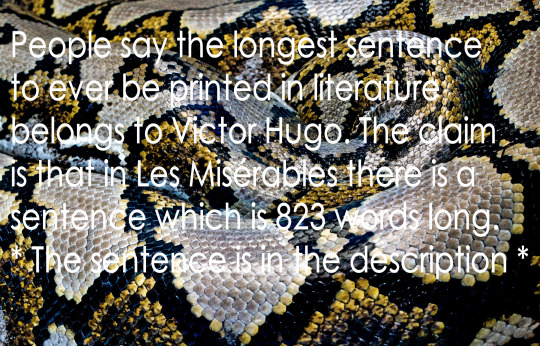
“The son of a father to whom history will accord certain attenuating circumstances, but also as worthy of esteem as that father had been of blame; possessing all private virtues and many public virtues; careful of his health, of his fortune, of his person, of his affairs, knowing the value of a minute and not always the value of a year; sober, serene, peaceable, patient; a good man and a good prince; sleeping with his wife, and having in his palace lackeys charged with the duty of showing the conjugal bed to the bourgeois, an ostentation of the regular sleeping-apartment which had become useful after the former illegitimate displays of the elder branch; knowing all the languages of Europe, and, what is more rare, all the languages of all interests, and speaking them; an admirable representative of the “middle class,” but outstripping it, and in every way greater than it; possessing excellent sense, while appreciating the blood from which he had sprung, counting most of all on his intrinsic worth, and, on the question of his race, very particular, declaring himself Orleans and not Bourbon; thoroughly the first Prince of the Blood Royal while he was still only a Serene Highness, but a frank bourgeois from the day he became king; diffuse in public, concise in private; reputed, but not proved to be a miser; at bottom, one of those economists who are readily prodigal at their own fancy or duty; lettered, but not very sensitive to letters; a gentleman, but not a chevalier; simple, calm, and strong; adored by his family and his household; a fascinating talker, an undeceived statesman, inwardly cold, dominated by immediate interest, always governing at the shortest range, incapable of rancor and of gratitude, making use without mercy of superiority on mediocrity, clever in getting parliamentary majorities to put in the wrong those mysterious unanimities which mutter dully under thrones; unreserved, sometimes imprudent in his lack of reserve, but with marvellous address in that imprudence; fertile in expedients, in countenances, in masks; making France fear Europe and Europe France! Incontestably fond of his country, but preferring his family; assuming more domination than authority and more authority than dignity, a disposition which has this unfortunate property, that as it turns everything to success, it admits of ruse and does not absolutely repudiate baseness, but which has this valuable side, that it preserves politics from violent shocks, the state from fractures, and society from catastrophes; minute, correct, vigilant, attentive, sagacious, indefatigable; contradicting himself at times and giving himself the lie; bold against Austria at Ancona, obstinate against England in Spain, bombarding Antwerp, and paying off Pritchard; singing the Marseillaise with conviction, inaccessible to despondency, to lassitude, to the taste for the beautiful and the ideal, to daring generosity, to Utopia, to chimeras, to wrath, to vanity, to fear; possessing all the forms of personal intrepidity; a general at Valmy; a soldier at Jemappes; attacked eight times by regicides and always smiling; brave as a grenadier, courageous as a thinker; uneasy only in the face of the chances of a European shaking up, and unfitted for great political adventures; always ready to risk his life, never his work; disguising his will in influence, in order that he might be obeyed as an intelligence rather than as a king; endowed with observation and not with divination; not very attentive to minds, but knowing men, that is to say requiring to see in order to judge; prompt and penetrating good sense, practical wisdom, easy speech, prodigious memory; drawing incessantly on this memory, his only point of resemblance with Caesar, Alexander, and Napoleon; knowing deeds, facts, details, dates, proper names, ignorant of tendencies, passions, the diverse geniuses of the crowd, the interior aspirations, the hidden and obscure uprisings of souls, in a word, all that can be designated as the invisible currents of consciences; accepted by the surface, but little in accord with France lower down; extricating himself by dint of tact; governing too much and not enough; his own first minister; excellent at creating out of the pettiness of realities an obstacle to the immensity of ideas; mingling a genuine creative faculty of civilization, of order and organization, an indescribable spirit of proceedings and chicanery, the founder and lawyer of a dynasty; having something of Charlemagne and something of an attorney; in short, a lofty and original figure, a prince who understood how to create authority in spite of the uneasiness of France, and power in spite of the jealousy of Europe, — Louis Philippe will be classed among the eminent men of his century, and would be ranked among the most illustrious governors of history had he loved glory but a little, and if he had had the sentiment of what is great to the same degree as the feeling for what is useful.”
9 notes
·
View notes
Text
Make way for Monsieur Larrey!
On that freezing night of December 14, 1840, they had all come.
The "Dromedaries" of Egypt, the artillerymen of Wagram, the voltigeurs of Spain, the cuirassiers of Waterloo, dressed in their legendary uniforms now threadbare, frayed, patched up, still bearing some traces of burns taken from the bivouac fires.
Since the Hotel des Invalides, many had limped on their canes or their wooden legs to regain the banks of Courbevoie as quickly as possible: these "Chabert" were not all colonels, far from it. Rolled up in their large coats, packed in small groups around improvised campfires, they went together, as comrades, to spend a last vigil to guard the mortal remains of the Emperor, resting on the landing stage of the Seine.
Twenty-one cannon shots greeted the departure of the funeral chariot for Paris in the morning, but the immense crowd, a million people, heard especially the singing of La Marseillaise, - forbidden - which the old soldiers of the Grande Armée had intoned, refrains immediately resumed by a multitude of inflamed students who felt running behind their backs the romantic thrill of a living legend. Alfred de Musset had just written: "Then sat down on a world in ruins a worried youth. All these children had dreamed for fifteen years of the snows of Moscow and the sun of the Pyramids."
They formed, veterans and students, the tail of the procession which, by the bridge, the avenue de Neuilly, the Arc de Triomphe, descended the Champs-Elysées, decorated with columns topped with golden eagles, statues of winged victories, of laurel garlands. Just behind the funeral chariot, the Prince of Joinville, son of King Louis-Philippe, the companions of Saint Helena, the surviving marshals, the former aides-de-camp, generals, servants.
A strange fact, contrasting with the solemnity of this sad ceremony, the attitude of the Parisian crowd who had kept the freedom of their feelings, oscillating from emotion to the joy of pointing the finger at such and such, of applauding an illustrious character from overcrowded balconies or packed sidewalks. Suddenly resonated, as on the footbridges of the Bérézina, the shout: "Make way for Monsieur Larrey!"
Just as quickly the ranks thinned out so that one could distinguish, leaning on his son's arm, the robust silhouette of Dominique-Jean Larrey, the famous chief surgeon of the imperial guard, immediately applauded by the veterans who called him their "Providence" as by the students proud of his teaching. Homage of old soldiers, homage of young people, what more could he dream of, this man of seventy-four, recognizable by his massive stature, by his long white hair covering his shoulders over which he had thrown his old Wagram coat?
Despite a cold of -15 degrees, the fatigue of age, Larrey had insisted on accompanying to the Concorde, then to the Invalides where resounded the first movement of Mozart's Requiem, the one he had followed, served, helped, from the sands of the Pyramids to the wheat fields of Waterloo.
With a flawless attachment to the person of the Emperor, of unfailing loyalty but perhaps the only one to stand up to him, master operator, master teacher, pioneer of war surgery, brilliant precursor of humanitarian science and medicine, Dominique Larrey had amply deserved the appreciation - the only one, moreover - given by the Emperor in his will: "He is the most virtuous man I have known."
Jean Marchioni - Place à Monsieur Larrey, chirurgien de la garde impériale.
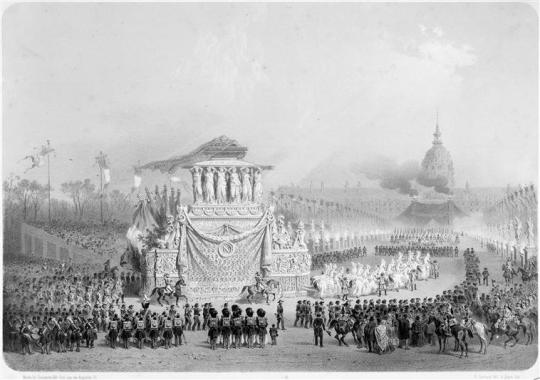
#xix#retour des cendres#jean marchioni#place à monsieur larrey#dominique jean larrey#i'm already loving this book
17 notes
·
View notes
Text
Janvier MMXXI
Films
Alexandre le Bienheureux (1968) de Yves Robert avec Philippe Noiret, Françoise Brion, Marlène Jobert, Paul Le Person et Pierre Richard
Les Mariés de l'an II (1971) de Jean-Paul Rappeneau avec Jean-Paul Belmondo, Marlène Jobert, Sami Frey, Laura Antonelli et Michel Auclair
Tendre Poulet (1978) de Philippe de Broca avec Annie Girardot, Philippe Noiret, Catherine Alric et Hubert Deschamps
Le cave se rebiffe (1961) de Gilles Grangier avec Jean Gabin, Maurice Biraud, Bernard Blier, Martine Carol et Françoise Rosay
Jackie (2016) de Pablo Larraín avec Natalie Portman, Greta Gerwig, Peter Sarsgaard et John Hurt
Ivanhoé (1952) de Richard Thorpe avec Robert Taylor, Elizabeth Taylor, Joan Fontaine et George Sanders
Nevada Smith (1966) de Henry Hathaway avec Steve McQueen, Karl Malden, Brian Keith, Arthur Kennedy, Suzanne Pleshette et Martin Landau
Les Enchaînés (Notorious) (1946) d’Alfred Hitchcock avec Cary Grant, Ingrid Bergman et Claude Rains
Mission impossible (Mission: Impossible) (1996) de Brian De Palma avec Tom Cruise, Emmanuelle Béart, Jon Voight et Jean Reno
Working Girl (1988) de Mike Nichols avec Melanie Griffith, Harrison Ford, Sigourney Weaver et Alec Baldwin
Man Trouble (1992) de Bob Rafelson avec Jack Nicholson, Ellen Barkin, Beverly D'Angelo et Veronica Cartwright
The Island (2005) de Michael Bay avec Scarlett Johansson, Ewan McGregor, Djimon Hounsou et Sean Bean
Vivement dimanche ! (1983) de François Truffaut avec Fanny Ardant, Jean-Louis Trintignant, Jean-Pierre Kalfon et Philippe Laudenbach
The Artist (2011) de Michel Hazanavicius avec Jean Dujardin, Bérénice Bejo, James Cromwell et John Goodman
Les Vikings (The Vikings) (1958) de Richard Fleischer avec Kirk Douglas, Tony Curtis, Janet Leigh et Ernest Borgnine
C'était un rendez-vous (1976) de Claude Lelouch avec Claude Lelouch et Gunilla Friden
Alceste à bicyclette (2013) de Philippe Le Guay avec Fabrice Luchini, Lambert Wilson et Maya Sansa
Mission : Impossible - Rogue Nation (2015) de Christopher McQuarrie avec Tom Cruise, Rebecca Ferguson, Simon Pegg et Jeremy Renner
Spectacle
L’Hôtel du libre échange (2015) de Georges Feydeau avec Thierry Beccaro, Virginie Guilhaume, Bruno Guillon, Valérie Maurice, Patrice Laffont et Carinne Teyssandier
La Dame de chez Maxim (2020) de Georges Feydeau avec Micha Lescot, Léa Drucker, André Marcon, Anne Rotger, Eric Prat, Christophe Paou, Reinhardt Wagner, Valerian Behar Bonnet
Le crédit (2019) de Jordi Galceran avec Didier Bénureau et Daniel Russo
Séries
Kaamelott Livre I, II
Un Roi à la taverne - Raison d’argent - L’Enlèvement de Guenièvre - L’Escorte II - Sous les Verrous - Vox Populi II - Unagi II - Les Exploités - Séli et les Rongeurs - Feue la vache de Roparzh - Les Alchimistes - Les Chiens de Guerre - La Botte Secrète II - Spiritueux - La Corde - Un Roi à la Taverne II - La Fête du Printemps - La Joute Ancillaire - La Garde Royale - L’Ambition - Le Reclassement - Silbury Hill - La Vigilance d’Arthur - La Chambre - Le Rassemblement du Corbeau - Le Terroriste - Le Portrait - La Révolte
Nestor Burma Saison 2, 3
Retour au bercail - L'Homme au sang bleu
Top Gear Saison 18,19, 7, 11, 8, 12, 13, 22, 21, 16
Feux croisés en Italie - 1500 km a fond de 5eme - Le Road Trip Ideal 2 : partie 1 - Le Road trip Ideal 2 : partie 2 - La vitesse en toute liberté - La traversée du Japon - Dans la vallée du feu - Les Top Gear Awards - Les pires voitures de l'histoire - Gordon Ramsay aux commandes ! - La première voiture amphibie - En tournée avec les Who ! - Trois camions d'enfer - Apprentis policiers - Passion vintage - Small is beautiful - S.O.S Urgences - Trophée Andros - Porsche Cayenne Turbo S contre parachutiste - La fièvre du vintage - USA : On Road Again - Nostalgie des années 80 - Road Trip à Tchernobyl - Mercedes, folle du désert - L'Albanie en Rolls-Royce - La Fiesta dans tous ses états - Surfin’ USA - Made in China - Caravane Tour
The Grand Tour Saison 2, 3, 1
Pas de script - Spécial Colombie : partie 1 - Spécial Colombie : partie 2 - Courses de Noël - Échappée marocaine - La Loi du plus fort - Oh oui, de l'essence
Chapeau melon et bottes de cuir Saison 5
Meurtres distingués - Interférences - Caméra meurtre
Friends Saison 2, 3
Celui qui affronte les voyous - Celui qui faisait le lien - Celui qui attrape la varicelle - Celui qui embrassait mal - Celui qui avait la technique du câlin - Celui qui ne supportait pas les poupées - Celui qui bricolait - Celui qui se souvient
Doctor Who
Revolution of the Daleks
Alexandra Ehle Saison 2
La Peste
Les petits meurtres d’Agatha Christie Saison 3
La Nuit qui ne finit pas
Livres
Sherlock Holmes et le Mystère du Haut-Koenigsbourg de Jacques Fortier
Batman : Dark Knight 1 : Résurrection de Frank Miller
OSS 117 : Tortures de Jean Bruce
Casse-pipe à la Nation de Léo Malet et Jacques Tardi
2 notes
·
View notes
Text
“The son of a father to whom history will accord certain attenuating circumstances, but also as worthy of esteem as that father had been of blame; possessing all private virtues and many public virtues; careful of his health, of his fortune, of his person, of his affairs, knowing the value of a minute and not always the value of a year; sober, serene, peaceable, patient; a good man and a good prince; sleeping with his wife, and having in his palace lackeys charged with the duty of showing the conjugal bed to the bourgeois, an ostentation of the regular sleeping-apartment which had become useful after the former illegitimate displays of the elder branch; knowing all the languages of Europe, and, what is more rare, all the languages of all interests, and speaking them; an admirable representative of the “middle class,” but outstripping it, and in every way greater than it; possessing excellent sense, while appreciating the blood from which he had sprung, counting most of all on his intrinsic worth, and, on the question of his race, very particular, declaring himself Orleans and not Bourbon; thoroughly the first Prince of the Blood Royal while he was still only a Serene Highness, but a frank bourgeois from the day he became king; diffuse in public, concise in private; reputed, but not proved to be a miser; at bottom, one of those economists who are readily prodigal at their own fancy or duty; lettered, but not very sensitive to letters; a gentleman, but not a chevalier; simple, calm, and strong; adored by his family and his household; a fascinating talker, an undeceived statesman, inwardly cold, dominated by immediate interest, always governing at the shortest range, incapable of rancor and of gratitude, making use without mercy of superiority on mediocrity, clever in getting parliamentary majorities to put in the wrong those mysterious unanimities which mutter dully under thrones; unreserved, sometimes imprudent in his lack of reserve, but with marvellous address in that imprudence; fertile in expedients, in countenances, in masks; making France fear Europe and Europe France! Incontestably fond of his country, but preferring his family; assuming more domination than authority and more authority than dignity, a disposition which has this unfortunate property, that as it turns everything to success, it admits of ruse and does not absolutely repudiate baseness, but which has this valuable side, that it preserves politics from violent shocks, the state from fractures, and society from catastrophes; minute, correct, vigilant, attentive, sagacious, indefatigable; contradicting himself at times and giving himself the lie; bold against Austria at Ancona, obstinate against England in Spain, bombarding Antwerp, and paying off Pritchard; singing the Marseillaise with conviction, inaccessible to despondency, to lassitude, to the taste for the beautiful and the ideal, to daring generosity, to Utopia, to chimeras, to wrath, to vanity, to fear; possessing all the forms of personal intrepidity; a general at Valmy; a soldier at Jemappes; attacked eight times by regicides and always smiling; brave as a grenadier, courageous as a thinker; uneasy only in the face of the chances of a European shaking up, and unfitted for great political adventures; always ready to risk his life, never his work; disguising his will in influence, in order that he might be obeyed as an intelligence rather than as a king; endowed with observation and not with divination; not very attentive to minds, but knowing men, that is to say requiring to see in order to judge; prompt and penetrating good sense, practical wisdom, easy speech, prodigious memory; drawing incessantly on this memory, his only point of resemblance with Caesar, Alexander, and Napoleon; knowing deeds, facts, details, dates, proper names, ignorant of tendencies, passions, the diverse geniuses of the crowd, the interior aspirations, the hidden and obscure uprisings of souls, in a word, all that can be designated as the invisible currents of consciences; accepted by the surface, but little in accord with France lower down; extricating himself by dint of tact; governing too much and not enough; his own first minister; excellent at creating out of the pettiness of realities an obstacle to the immensity of ideas; mingling a genuine creative faculty of civilization, of order and organization, an indescribable spirit of proceedings and chicanery, the founder and lawyer of a dynasty; having something of Charlemagne and something of an attorney; in short, a lofty and original figure, a prince who understood how to create authority in spite of the uneasiness of France, and power in spite of the jealousy of Europe, — Louis Philippe will be classed among the eminent men of his century, and would be ranked among the most illustrious governors of history had he loved glory but a little, and if he had had the sentiment of what is great to the same degree as the feeling for what is useful.” by victor hugo
#les miserables#les mis#victor hugo#enjolras#grantaire#jean valjean#marius pontmercy#bahorel#bossuet#joly#musichetta#jehan prouvaire#eponine#cosette#fantine#javert#again still haven't had much sleep#i think i'm funny sometimes#safe to rb
49 notes
·
View notes
Text
Sketching Les Mis Chapter 4.1.2 - Badly Sewed
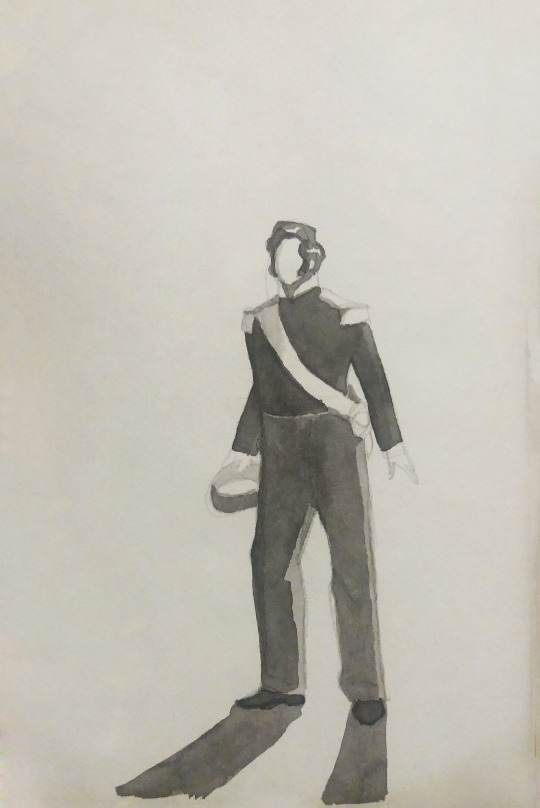
1. It's him! His majesty the Pear!
2. Okay so first off, I read "badly sewed" and thought it had to do with the Sewer Digression somehow before I read it a second time and I was trying very hard to understand what those two things had to do with each other.
3. This chapter had Victor Hugo giving a lot of punches in the face of the bourgeoisie. Basically he said that the bourgeois statesmen, satisfied with being in power, took their seats and by that, they halted the revolution. (He also mentioned he doesn't consider the Bourgeoisie a social class because what defines the Bourgeoisie for him is their conformism, and that is not in itself a condition of class in his opinion. That's... a weird way to look at class but tbh I wish he had said more about that because I think he might be onto something specially since nobility and Bourgeoisie in those days were more easily separated and a Bourgeois in the eye of the government is more like a peasant than a noble. Money and means is not necessarily what Victor Hugo uses to describe social class. I think I better keep that in mind for later).
Anyway, they sought out another sovereign to replace the last one. Louis-Philippe D'Orléans was a safe choice (unrelated note: Orléans is one of the two main families that make the Brazilian monarchy and Idk how related Louis-Philippe is to our kings but it's a fun fact for ya). I mean compare this portrait of Charles X with Louis-Philippe and tell me this pear isn't a bourgeois king:
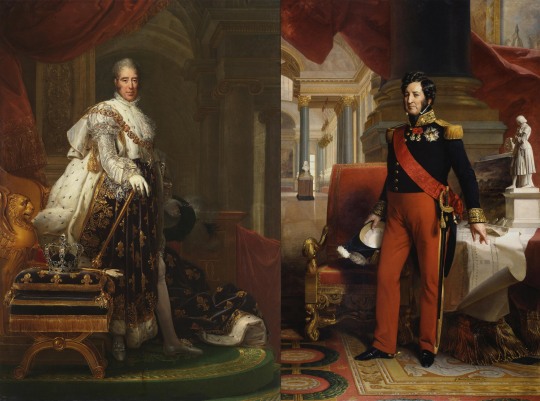
Lafayette crowned Louis-Philippe and that was that. There is also a weird bit that makes it seem like Hugo is saying the separation of church and state is bad because? It gives more power to the king? Idk what Victor Hugo is talking about like, half the time
4. Victor Hugo defines the time of the July monarchy as a halt. A double state of perpetual rest and perpetual vigilance. No progress and a fear of revolt. "A halt supposes battle yesterday and battle tomorrow."
18 notes
·
View notes
Text
2nd Regnant Queen and 29th Monarch of Portugal (9th of the Bragança Dynasty): Queen Maria II of Portugal, “The Educator/The Good Mother”
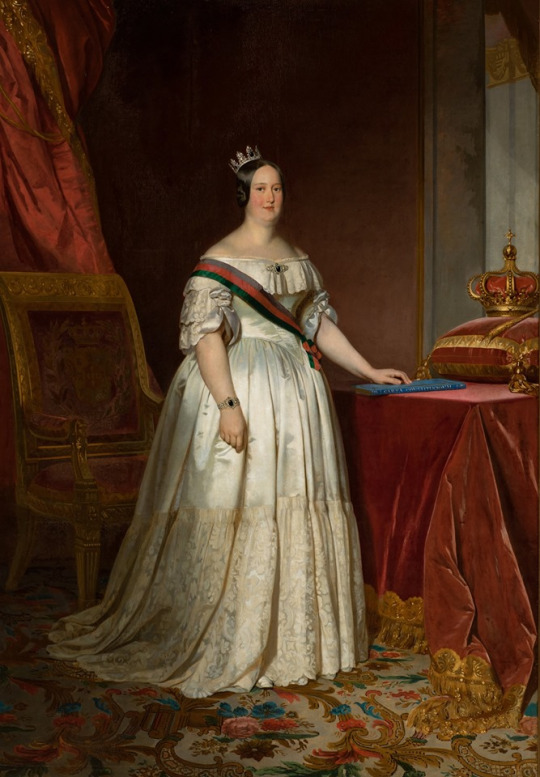
Reign: 26 May 1834 – 15 November 1853 Acclamation: 20 September 1834 Predecessor: Pedro IV
Maria II (4 April 1819 In Rio de Janeiro – 15 November 1853 in Lisbon) "the Educator" ("a Educadora") or "the Good Mother" ("a Boa Mãe"), reigned as Queen of Portugal from 1826 to 1828, and again from 1834 to 1853. Born in Rio de Janeiro, she was the first child of King Pedro IV of Portugal (Pedro I of Brazil) and his first wife, Queen Maria Leopoldina, and thus a member of the House of Bragança. One of the two surviving children born when Pedro was still heir apparent to Portugal, she inherited Portuguese titles and was placed in the line of succession to the former Portuguese throne, even after becoming a member of the Brazilian Imperial Family, from which she was excluded in 1835 after her definitive ascension to the Portuguese throne.

Maria II was born Maria da Glória Joana Carlota Leopoldina da Cruz Francisca Xavier de Paula Isidora Micaela Gabriela Rafaela Gonzaga on 4 April 1819 in the Palace of São Cristóvão
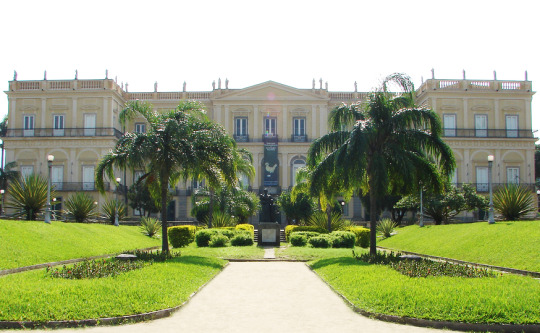
in Rio de Janeiro, Kingdom of Brazil. She was the eldest daughter of the Prince Pedro de Alcântara, future King of Portugal as Pedro IV and first Emperor of Brazil as Pedro I, and his first wife Maria Leopoldina (née Archduchess Caroline Josepha Leopoldine of Austria), herself a daughter of Francis II, Holy Roman Emperor. She was titled Princess of Beira upon her birth. Born in Brazil, Maria was the only European monarch to have been born outside of Europe, though she was still born in Portuguese territory.
The death of Maria's grandfather, King João VI, in March 1826 sparked a succession crisis in Portugal. The king had a male heir, Pedro,

but Pedro had proclaimed the independence of Brazil in 1822 with himself as Emperor. The late king also had a younger son, Miguel,
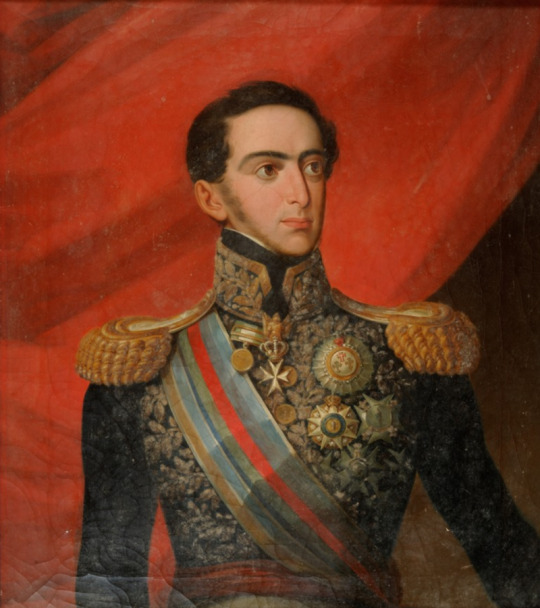
but he was exiled to Austria after leading a number of revolutions against his father and his liberal regime.
Before his death, the king had nominated his favourite daughter, Isabel Maria, to serve as regent until "the legitimate heir returned to the kingdom" — but he had failed to specify which of his sons was the legitimate heir: Pedro, the liberal Emperor of Brazil, or Miguel, the absolutist exiled prince.
Most people considered Pedro to be the legitimate heir, but Brazil did not want him to unite Portugal and Brazil's thrones again. Aware that his brother's supporters were ready to bring Miguel back and put him on the throne, Pedro decided for a more consensual option: he would renounce his claim to the Portuguese throne in favour of his daughter Maria (who was only seven years old), and that she was to marry her uncle Miguel, who would accept the liberal constitution and act as a regent until his niece reached majority.
Miguel pretended to accept, but upon his arrival in Portugal he immediately deposed Maria and proclaimed himself king, abrogating the liberal constitution in the process. During his reign of terror, Maria traveled to many European courts, including her maternal grandfather's in Vienna, as well as London and Paris.
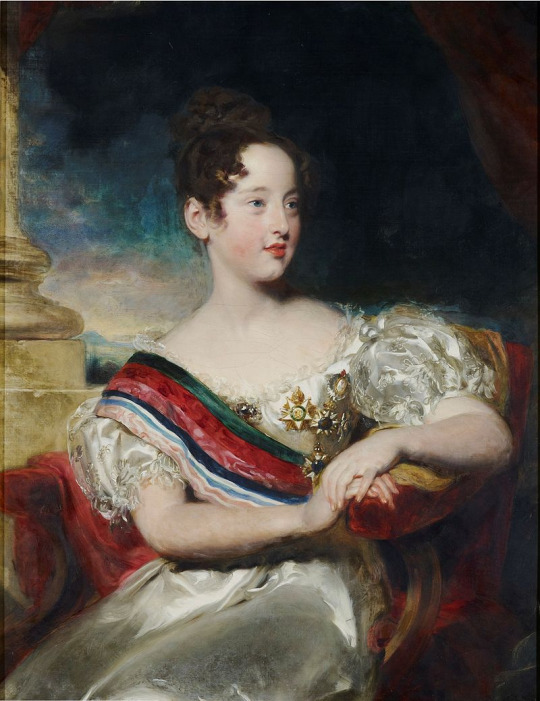
Maria's first reign was interrupted by the absolutist uprising led by her uncle, fiancé and regent Miguel, who proclaimed himself King of Portugal on 23 June 1828. Then began the Liberal Wars that lasted until 1834, the year in which Maria was restored to the throne and Miguel exiled to Germany.
The Marquis of Barbacena,
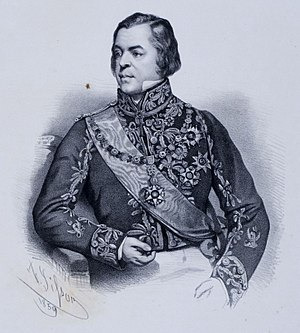
arriving in Gibraltar with the princess on 3 September 1828, was informed by an emissary of what was happening in Portugal. He had the foresight to understand that Miguel had come from Vienna determined to put himself at the head of the absolutist movement, advised by Prince Klemens von Metternich,

who was directing European politics, and so it was dangerous for the young Queen to go to Vienna. Taking responsibility, he changed the direction of the journey, and departed for London, where he arrived on 7 October. English policy was not conducive to its purpose. The Duke of Wellington's
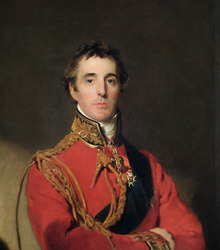
office openly sponsored Miguel, so the asylum the Marquis had sought was not safe. Maria II was received in court with the honors due to her high hierarchy, but the British prevented their subjects there emigres to go to reinforce the garrison of the island Terceira.
Miguel's coup d'état had not gone unrevealed. On 16 May 1828, the garrison of Porto revolted, and in Lagos an infantry battalion. The revolts were stifled. Saldanha, Palmela, and others, who had come to take charge of the movement in Porto, re-embarked on Belfast ship, which had brought them; the Porto garrison, reinforced by the academic volunteers of Coimbra and other liberal troops, emigrated to Galiza and from there to England. At the head of a small liberal expedition, the Marquis of Saldanha attempted to disembark in Terceira, Azores, but was not allowed to take the English cruise, whose vigilance he could not avoid for some time after the Count of Vila Flor, later of Terceira, was able to disembark. In time, because in August 1829 appeared in front of the island a huge Miguelist squad that sent to soil a body of disembarkation. Then there was the Battle of August 11 in the village of Praia, where the miguelists were defeated. When the emigrants in England received the news of the victory, they felt great enthusiasm. They soon lost hope of knowing that the young queen was returning to the Brazilian Empire to her father. In fact, the situation of Maria II in the English court, next to the ministry in the power, became embarrassing and humiliating. The Queen left London to meet her future stepmother, Amélie of Leuchtenberg.
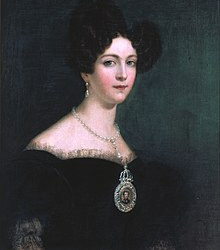
They left together on 30 August 1829 for Rio de Janeiro, arriving on 16 October.
The constitutional cause was thought to have been lost. The dispersed emigres (France, England and Brazil) were divided into rival factions. Only Terceira Island recognized the constitutional principles, and even there appeared miguelists guerillas. France was ready to recognize Miguel's government when the revolution of July broke out in Paris in 1830, which encouraged the Portuguese liberals.
In 7 April 1831, Pedro IV abdicated the imperial crown of Brazil on behalf of his son Pedro II,
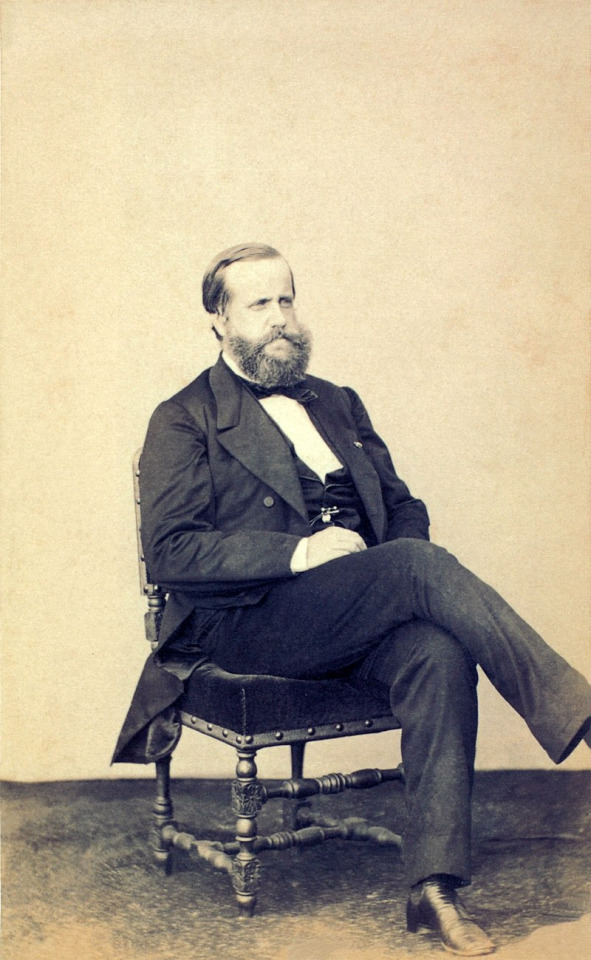
Maria's younger brother, and came to Europe with his daughter and his second wife, to support his daughter's rights to the crown from Portugal and joined the forces loyal to Maria in the Azores in their war against Miguel. He took the title of Duke of Bragança, and Regent in her name.
Almost at the same time the regency of the Ilha Terceira, named by Pedro and composed of the Marquis of Palmela, the Count of Vila Flor and José António Guerreiro, prepared an expedition that soon took possession of the Azores. While extending the constitutional territory, Pedro disembarked in France, being welcomed with sympathy by the new government and by Louis Philippe I.
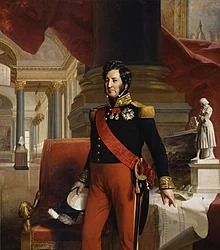
Miguel's government had defied the immunities of French subjects, had not at once satisfied the complaints of the French government, which had sent a squadron commanded by Admiral Roussin to force the bar of Lisbon and impose humiliating conditions of peace.
Pedro left his daughter in Paris to finish her education, delivered to her stepmother, Empress Amélie, with good masters, and left for the Azores at the head of an expedition organized on the island of Belle Isle, bringing his supporters together. Arriving in the Azores on 3 March 1832, he formed a new ministry, assembled a small army, whose command he gave to the Count of Vila Flor, and carried him aboard a squadron which he delivered to the English officer Sartorius, and departed for mainland Portugal. July 8 at Memória Beach in Matosinhos. It was followed by the Siege of Porto and a series of battles until, on 24 July 1833, the Duke of Terceira entered victorious in Lisbon, having won the Battle of Cova da Piedade the day before. Porto and Lisbon, the main cities, were in the power of the liberals. Pedro came to Lisbon, and summoned his daughter from Paris, forcing his brother, Miguel to abdicate in 1834. Maria was thereupon restored to the throne, and obtained an annulment of her betrothal. Soon after her restoration to the throne, her father died from tuberculosis.
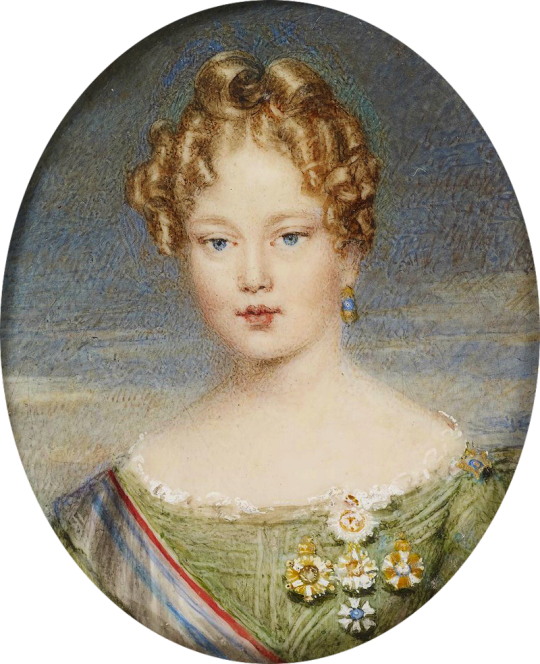
On 7 February 1833, in order to protect the Queen, the 2nd Lancers Regiment was created, first known as the Regimento de Lanceiros da Rainha (Queen's Lancers Regiment), with the motto Morte ou Glória, "Death or Glory" (the same as the 17th Lancers, since Lt. Col. Sir Anthony Bacon was its first commander), a fortunate coincidence since the queen's name was Maria da Glória.
Occupying the Portuguese throne, Maria II was still heir presumptive to her brother Pedro II as Princess Imperial of Brazil, until her exclusion from the Brazilian line of succession by law no. 91 of 30 October 1835.
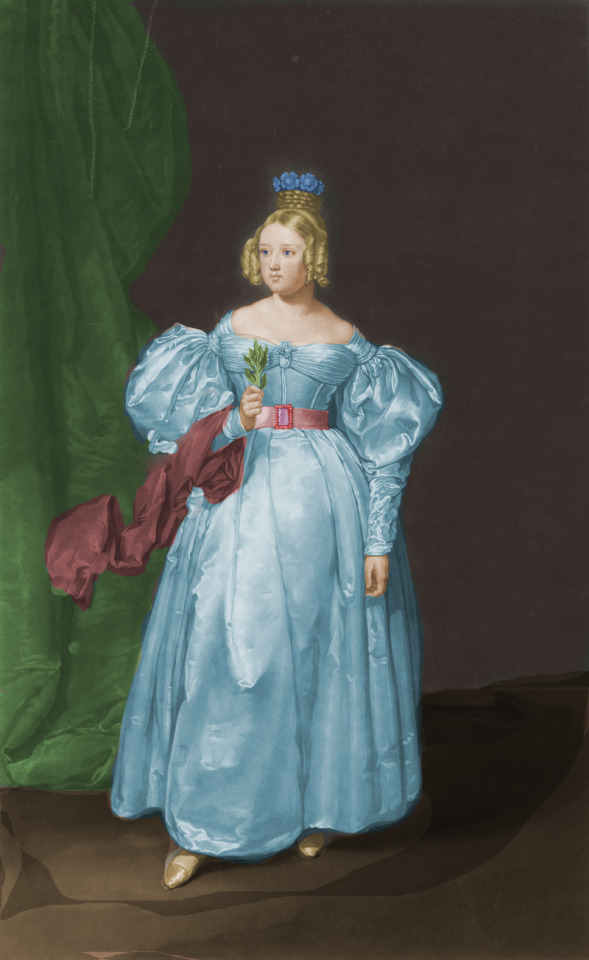
Maria married Auguste, Duke of Leuchtenberg,
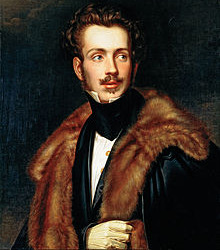
son of Eugène de Beauharnais
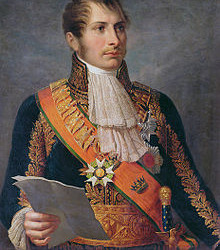
and grandson of the Empress Josephine of France,
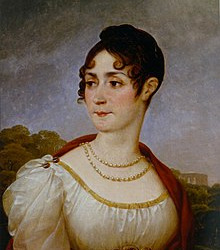
on 26 January 1835, at the age of fifteen. However, he died only two months later, on 28 March 1835.
On 9 April 1836, she married the cultured and able Prince Ferdinand of Saxe-Coburg and Gotha. In accordance with Portuguese law, Ferdinand received the title of king upon the birth of their first child and heir, Pedro.
In 1842, Pope Gregory XVI

presented Maria with a Golden Rose.

Maria's reign saw a revolutionary insurrection on 16 May 1846, but this was crushed by royalist troops on 22 February 1847, and Portugal otherwise avoided the European Revolution of 1848. Maria's reign was also notable for a public health act aimed at curbing the spread of cholera throughout the country. She also pursued policies aimed at raising the levels of education throughout the country.
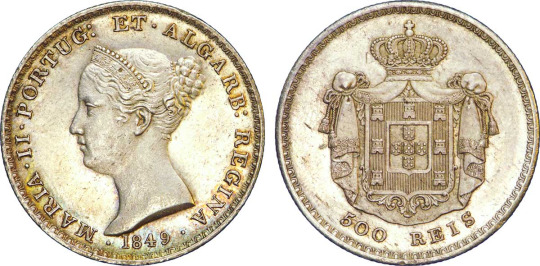
From her first pregnancy, at the age of eighteen, Maria II faced problems in giving birth, with prolonged and extremely difficult labor. An example of this was her third gestation, whose labor lasted 32 hours, after which a girl was baptized in articulo mortis with the name of Maria (1840).
At 25 years of age and in her fifth gestation, the sovereign became obese and her births became even more complicated. In 1847, the fetal distress that preceded the birth of her eighth child – the Infante Augusto, Duke of Coimbra – brought to the world a child "quite purple and with little breathing".
The dangerous routine of successive pregnancies, coupled with obesity (which eventually caused her heart problems) and the frequency of dystocic births (worrisome, especially as a multiparous woman) led doctors to warn the queen about the serious risks she would face in future pregnancies. Indifferent to the warnings, Maria II merely replied: "If I die, I die at my post."

On 15 November 1853, thirteen hours after the onset of labor of the stillborn infant Eugenio, her eleventh child, Maria II died at the age of 34. The announcement of death was published in the Government Gazette of November 16, 1853:
“Paço das Necessidades, November 15, 1853, at half an hour after noon.
Her Majesty the Queen began to notice announcements of childbirth at nine-thirty on the night of the day. Difficulties appeared in the progress of the same childbirth, which forced the doctors to resort to operations, for which the extraction of an infant was obtained, of time, which received the baptism before being extracted.
The result of these operations took place at ten o'clock in the morning. Unfortunately, after an hour and a half, Her Majesty, exhausted from all strength, declared "I surrender my soul to God after having received all the sacraments."
In a letter dated November 28, 1853, the Duchess of Ficalho, the queen's maid, reported the outcome to her brother, the 2nd Earl of Lavradio:
“At two o'clock after midnight from the 14th to the 15th, I was ordered to go to the Palace, where I arrived at about three o'clock. I found the Empress in the Queen's room, where I immediately entered, thinking Her Majesty troubled and even little then we left the immediate room and asked Teixeira what he thought, telling us: "Your Majesty is going well, but slowly." I did not like it, and it was like that, until Teixeira called the doctors, who were out and who had not seen the Queen, and as soon as they examined her, the horrible operation was decided: the doctors were Teixeira, Farto, Kessler, Elias and Benevides. Kessler immediately dismissed the case as very dangerous. The operation was begun. I climbed onto the bed. On the right side, the Empress, full of tears; the Queen, with no fainting, but with a very bad opinion, and, complaining that she was suffering enough, said in her natural voice: "O Teixeira, if I am in danger, tell me, do not deceive me."
Queen Maria II is remembered as a good mother and a kind person who always acted according to her convictions in her attempt to help her country. She was later given the nickname "The Good Mother."
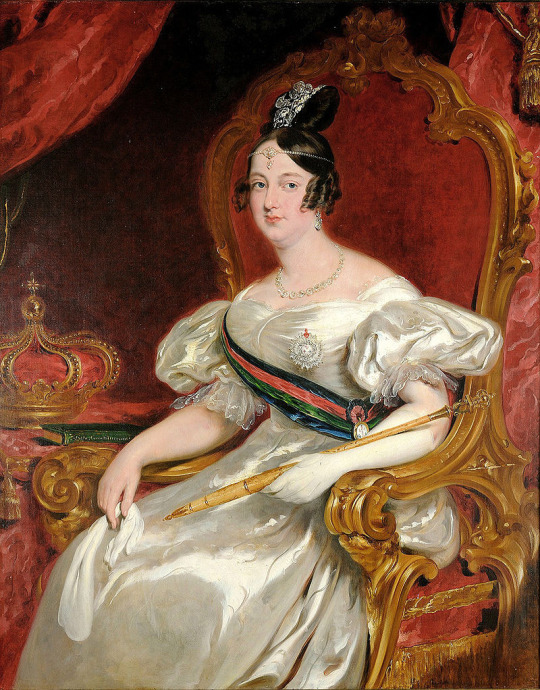
She was buried in the Bragança Pantheon,in Monastery of São Vicente de Fora. :

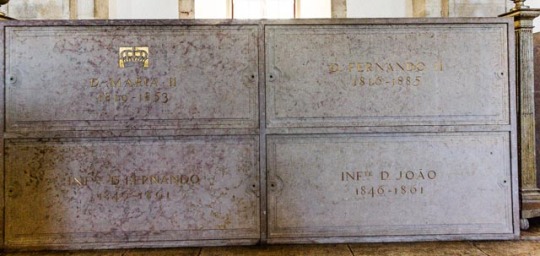
Maria first married Auguste Charles, 2nd Duke of Leuchtenberg, son of Eugène de Beauharnais, grandson of Empress Josephine, who died soon after arriving in Portugal. She then married Ferdinand of Saxe-Coburg and Gotha, son of Prince Ferdinand Georg August of Saxe-Coburg and Gotha and his wife Princess Maria Antonia Koháry de Csábrág.
Pedro (16 Setember 1837 - 11 November 1861) Succeeded his mother as Pedro V, King of Portugal.
Luís (31 October 183819 October 1889) Succeeded his brother, Pedro, as King of Portugal.
Infanta Maria (4 October 1840) Stillborn daughter.
Infante João (16 March 1842 - 27 December 1861) Duke of Beja
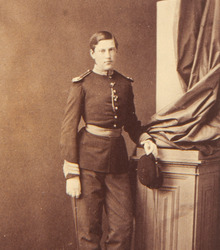
Infanta Maria Ana (21 August 1843 - 5 February 1884) Married King George of Saxony and was the mother of King Frederick August III of Saxony.
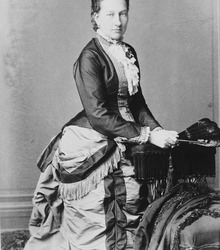
Infanta Antónia (17 February 1845 - 27 December 1913) Married Leopold, Prince of Hohenzollern, and was the mother of King Ferdinand I of Romania.

Infante Fernando of Portugal (23 July 1846 - 6 November 1861) Died of cholera at age 15.
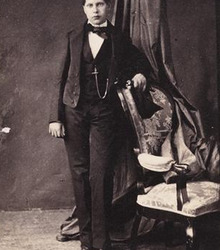
Infante Augusto (4 November 1847 - 26 September 1889) Duke of Coimbra

Infante Leopoldo (7 May 1849) Stillborn son.
Infanta Maria da Glória (3 February 1851) Stillborn daughter
Infante Eugénio (15 November 1853) Died some hours after the death of his mother.
10 notes
·
View notes
Text
Saulieu : Patrick Bertron (Relais Bernard Loiseau) prend sa retraite
Après plus de 40 années de bons et savoureux services, Patrick Bertron prépare en douceur une nouvelle vie qui lui laissera plus de temps pour sillonner les chemins du Morvan à VTT. C’est désormais officiel : Louis-Philippe Vigilant, pur produit de la grande maison Loiseau, lui succède à Saulieu. La transmission marie alors l’héritage d’un lieu emblématique à la créativité de ses acteurs. Elle…
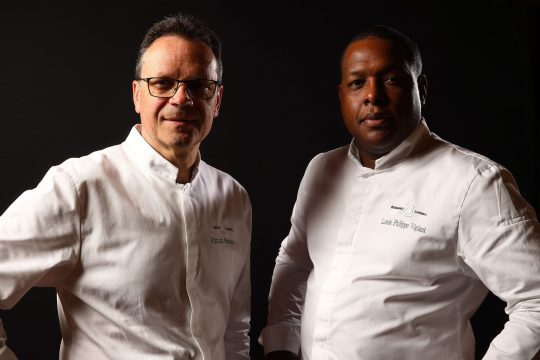
View On WordPress
0 notes
Text
Man charged in Montreal hit-and-run that killed 7-year-old Ukrainian refugee
A 45-year-old man has been charged with causing the hit-and-run death of a young Ukrainian refugee in central Montreal. The man, Juan Manuel Becerra Garcia, appeared in court on Wednesday, where he was charged with leaving the scene of a fatal accident. He asked for a Spanish translator. He will remain in custody and will appear again on Thursday.
Garcia is from the borough of Saint-Hubert, in Longueuil, on Montreal's south shore. Prosecutors allege he struck Maria Legenkovska, 7, who was walking to school on Tuesday morning in Montreal's Ville-Marie borough, and then fled the scene. Legenkovska was a refugee who had fled the war in Ukraine.
"It's a nightmare," said Michael Shwec, the president of the Quebec chapter of the Ukrainian Canadian Congress, an organisation that is providing support to her mother and siblings.
"The family came here to find refuge, and it's an absolute nightmare, especially in the holiday period." Schwec said a priest from a local Ukrainian parish was in touch with the family. Money was already pouring into a crowdfunding campaign on GoFundMe to help pay for the girl's funeral.
Legenkovska's father is still in Ukraine, Schwec said, where men have been conscripted to fight invading Russian forces. "The community is in shock," he said. "We are sending all our prayers to the family, to the mother, and of course to the father, who is still in Ukraine."
At the scene of the hit-and-run on Wednesday, near the intersection of Parthenais and de Rouen streets, police officers kept a close eye on motorists and issued tickets to some who drove through the area faster than the posted speed limit or failed to fully stop at intersections.
Candles lay near where Legenkovska was hit, signs of an impromptu vigil the night before, where locals and some of the girl's friends gathered to pay tribute to her. Neighbors who lived at the corner where she was struck said they had seen cars drive quickly through the area, which is a school zone.
The incident, they said, could have been avoided with proper security measures. "We're angry because we've been saying for years that there are traffic problems in the neighborhood and that it's dangerous for children to go to school," said Philippe Bouchard, who lives right in front of the accident site.
After striking the child, the police say Garcia drove off, leaving her seriously injured on the road. Witnesses said several children, including two of the Legenkovskas’ siblings, watched helplessly at the scene.
A group of nurses and a doctor from a nearby clinic performed first aid on the girl, but police announced her death early Tuesday evening. Garcia later turned himself in to police and was questioned by investigators before he appeared in court to be charged on Wednesday.
The corner where Legenkovska was struck is south of Sherbrooke Street, a connection between the Louis-Hippolyte-La Fontaine tunnel and the Jacques-Cartier Bridge.
Since the tunnel is under construction, more people have been driving toward the Jacques-Cartier Bridge, and some of them are avoiding busy streets by taking side streets, according to François Desaulniers, a local resident who has advocated for safer streets.
"With the tunnel La Fontaine work, we've seen increased traffic. “Even though it's 10 kilometres away, people want to get to the Jacques-Cartier Bridge, so instead of going through the main streets, they're going through our streets," he said in an interview on CBC Daybreak.
Sophie Mauzerolle, the member of Montreal's executive committee who is in charge of mobility and transportation and also the city councillor for the district in which Legenkovska was hit, said speed bumps or curb extensions could be installed in the area.
"We're going to be doing everything we can to avoid these tragedies that are happening too often on our streets," she said. Premier François Legault urged all drivers to use caution, particularly near schools.
"We have someone who flees a war zone to come here and is hit." “It's so sad," he said. "We need to be careful in school zones."
0 notes
Text
12 Août 1915: élection de Philippe Sudre Dartiguenave sous la vigilance des marines Américains
12 Août 1915: élection de Philippe Sudre Dartiguenave sous la vigilance des marines Américains.-#Juno7 #J7août2022
“Un peuple sans mémoire est un peuple sans avenir”, disait Aimé Césaire. Voici l’éphéméride du 12 août 2022. Premier président de l’occupation américaine, son élection par l’Assemblée nationale est due à son caractère flexible et à l’acceptation des conditions stipulées par les Américains. Son premier cabinet comporta cinq ministres: Léon Déjean : Relations Extérieures et Cultes Louis Auguste…
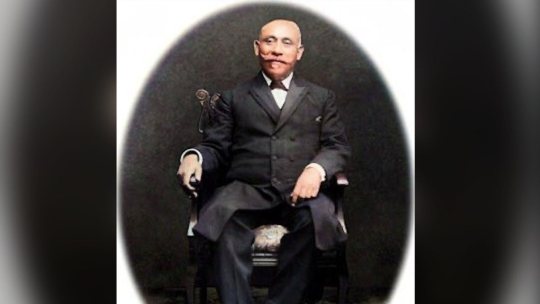
View On WordPress
0 notes
Text
Le premier et le plus jeune chef antillais étoilé
Le premier et le plus jeune chef antillais étoilé
Le premier et le plus jeune chef antillais étoilé
« J’aime les choses simples » : cette phrase, Louis-Philippe Vigilant, chef à Loiseau des Ducs de Dijon (Bourgogne), la répète souvent. « Je sers une cuisine simple, lisible, très goûteuse et très colorée ».
La recette plaît : en 2014, il apparaît pour la première fois au Guiche Michelin. L’année suivante, il est distingué Espoir Gault et…
View On WordPress
0 notes
Text
Most Dictators Self Destruct. Why?
With authoritarian rulers ascendant in many parts of the world, one wonders what must happen for their countries to liberalize. The likes of Vladimir Putin in Russia, Recep Tayyip Erdogan in Turkey or Xi Jinping in China are entrenched, experienced and not unpopular — so should their opponents simply resign themselves to an open-ended period of illiberal rule?
According to Daniel Treisman, a UCLA political scientist, that's not necessarily the case. For a recent paper, he analyzed 218 episodes of democratization between 1800 and 2015 and found they were, with some exceptions (such as Danish King Frederick VII's voluntary acceptance of a constitution in 1848), the result of authoritarian rulers' mistakes in seeking to hold on to power. The list of these errors is both a useful handbook for authoritarians and a useful reminder that even the most capable of them are fallible, with disastrous consequences for their regimes.
According to Treisman, deliberate liberalization — whether to forestall a revolution, motivate people to fight a foreign invader, defeat competing elite groups or make a pact with them — only occurred in up to a third of the cases. In the rest, democratization was an accident: As they set off a chain of events, rulers didn't intend to relinquish power. Some of them — such as Mikhail Gorbachev, the last Soviet president — have admitted as much.
Treisman's list of mistakes is worth citing in full. There are five basic ones:
Hubris: An authoritarian ruler underestimates the opposition's strength and fails to compromise or suppress it before it's too late. King Louis Philippe of France was deposed in 1848 after, as Treisman puts it, turning "a series of reform banquets into revolution by refusing even mild concessions." Romanian Communist dictator Nicolae Ceausescu was making a routine speech when he realized he was being overthrown. Indonesian President Muhammad Suharto believed he could get the country under control right up to the moment of his resignation.
Needless risk: A ruler calls a vote which he "fails to manipulate sufficiently" (like Chilean dictator Augusto Pinochet in 1988, when he lost a plebiscite on whether he should be allowed to stay in power) or starts a war he cannot win (like Leopoldo Galtieri in Argentina with the Falklands conflict of 1982).
Slippery slope: That's Gorbachev's case: a ruler starts reforms to prop up the regime but ends up undermining it.
Trusting a traitor: This is not always a mistake made by the dictator itself, although it was in the case of Francisco Franco in Spain, who chose King Juan Carlos, the dismantler of fascism, as his successor. In Gorbachev's case, it was the Politburo — the regime's elite — that picked the wrong man to preserve its power.
Counterproductive violence: Not suppressing the opposition when necessary can be a sign of hubris in a dictator, but overreacting is also a grave mistake. The example Treisman gives is Bangladeshi President Hussain Muhammad Ershad, who was forced to resign by an uprising that started after police shot an opposition activist at a rally. But the error was also made by Ukrainian President Viktor Yanukovych in 2013, when his riot police descended on a few hundred peacefully protesting students and brutally beat them, setting off the much bigger protests that resulted in Yanukovych's ouster.
These are all very human errors of judgment. Dictators are people, too, and sometimes they'll act on imperfect information or erroneous gut feeling. But Treisman makes the point that they may be prone to such errors precisely because they are dictators. They'll be fooled by polls which people don't answer sincerely, taken in by their own propaganda (like Malawi ruler Hastings Banda, who called and lost a referendum in 1993 because he'd been impressed by the high turnout at rallies in his support even though people had been forced to attend them). And sometimes they'll rule for so long that their mental faculties will be less sharp than at the outset.
I have a particular interest in watching Putin for any of the errors on Treisman's list. So far, it's as if he'd read the paper before Treisman wrote it. His suppression has been timely and cleverly measured, his election manipulation always sufficient, his temporary successor, Dmitri Medvedev, avoided the liberal slippery slope, and he's only started wars against much weaker rivals. He helps his regime's propaganda by treating it as truth, but he doesn't buy it to the point of losing vigilance. In the 2018 election, he kept his main opponent, Alexei Navalny, out of the race, mindful that modern technology allows a rival to loosen media restrictions -- something Treisman notes can lead a hubristic dictator to an electoral loss.
But even Putin, after 17 years in power, is in danger of making a miscalculation one day, perhaps finally misreading the mood of the increasingly cynical Russian public that keeps registering support for him in largely worthless polls. It's easy to imagine the choleric Erdogan getting into an armed conflict Turkey cannot sustain or using disproportional violence as Turks' patience with his reprisals wear thin. It's a possibility, although a remote one, that, after Xi's power consolidation, the Chinese Communist Party will opt for a more liberal successor and he won't be able to hold the reins as tightly.
Treisman notes that in 85 percent of the episodes he studied, democratization was preceded by mass unrest. Sooner or later, people tend to get tired of regimes in which they have little say. Then, it only takes a misstep from the one person at the center of such a regime. Dictators often overestimate the external danger to their power, the plots of foreign or exiled enemies. In the final analysis, they are the biggest threat to themselves.
https://getpocket.com/explore/item/most-dictators-self-destruct-why?utm_source=pocket-newtab
0 notes